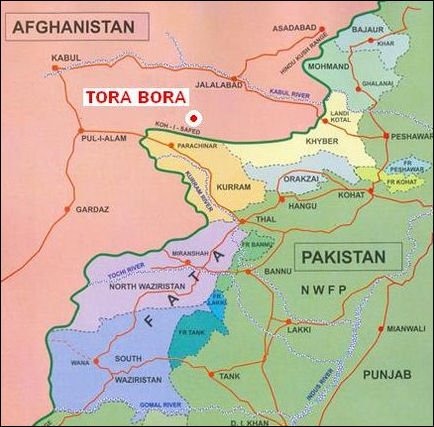OSAMA BIN LADEN RETURNS TO SAUDI ARABIA

After the Soviets withdrew from Afghanistan IN 1989, Osama bin Laden returned home to Saudi Arabia. He was welcomed as a hero, and took up the family business. At this point bin Laden was loyal to the Saudi royal family. He contacted them through his brothers and among other thinks warned them that Saddam Hussein was going to invade Kuwait. Osama bin Laden said in 1999: “A year before Hussein entered Kuwait, I said many times in my speeches at the mosques, warning that Saddam will enter the Gulf. No one believed me. I distributed many tapes in Saudi Arabia. It was after it happened that they started believing me and believed my analysis of the situation.” [Source: Peter Bergen, Vanity Fair, January 2006]
John-Thor Dahlburg and Alex Rodriguez wrote in the Los Angeles Times: In August 1990, when Iraqi dictator Saddam Hussein's forces overran Kuwait, the panicked Saudis worried that their country might be next. Though Bin Laden had grown increasingly critical of the monarchy, he offered to raise an army of Afghan war veterans to defend the kingdom. Members of the royal family gave him a polite hearing, but refused his offer. Instead, they called on the United States to provide protection. [Source: John-Thor Dahlburg and Alex Rodriguez, Los Angeles Times May 2, 2011]
After Iraq invaded Kuwait, Osama bin Laden told a senior official in the Saudi government, “We are ready to get the Iraqi forces out of Kuwait.” But the state policy had already been decided and U.S. forces had to be called in to get the Iraqis out of Kuwait. Abu Jandal, a Yemeni who became one of bin Laden’s bodyguards, told Al-Quds al-Arabi newspaper, 2004: [Bin Laden] called on the Saudi government to allow for the recruitment of youths in order to defeat the Iraqi invasion. His intentions were geared toward ending the Iraqi occupation of Kuwait and rescuing the Iraqi people from the domination of the Ba’th Party [Saddam Hussein’s nationalist-socialist organization]. Sheikh Osama bin Laden was dreaming of this. He said he was ready to prepare more than 100,000 fighters in three months. He used to say: “I have more than 40,000 mujahideen in Saudi Arabia alone.” These were trained in Afghanistan.
In “The Bin Ladens” Coll wrote that when the Saudi royal family agreed in the summer of 1990 to the arrival of American troops in response to Iraq’s invasion of Kuwait, Mr. bin Laden “offered no public dissent” at the time, but “moved quickly with the rest of his family to protect his personal fortune against the possibility that the Al-Saud regime might collapse.” Although he had come to see himself as an “international Islamic guerrilla leader,” his views at the time, Mr. Coll writes, were still “nuanced, changeable and laced with contradictions.” [Source: Michiko Kabutani, New York Times, April 1, 2008; The Bin Ladens: An Arabian Family in the American Century by Steve Coll (Penguin Press, 2008)]
Prince Turki, former head of Saudi intelligence, told the Arab News in 2001: [Bin Laden] believed that he was capable of preparing an army to challenge Saddam’s forces. He opposed the Kingdom’s decision to call friendly forces [500,000 U.S. military personnel]. By doing so, he disobeyed the ruler and violated the fatwa of senior Islamic scholars, who had endorsed the plan as an essential move to fight [Saddam’s] aggression. I saw radical changes in his personality as he changed from a calm, peaceful, and gentle man interested in helping Muslims into a person who believed that he would be able to amass and command an army to liberate Kuwait. It revealed his arrogance.
Osama bin Laden Becomes Vehemently Anti-American After the Persian Gulf War in 1990
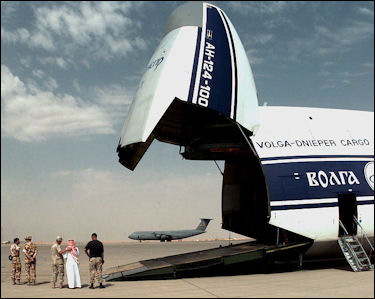
American military arriving in
Saudi Arabia on Russian plane Osama bin Laden was angry when the Saudi royal family turned down his offer of help and became angrier still when American troops were brought in to protect Saudi Arabia. He called the arrival of the Americans as “the most shocking moment of my life.” Bin Laden believed that having American troops in Saudi Arabia was polluting holy soil even though they were invited there by the Saudi king. Osama bin Laden called the placement of American troops in Saudi Arabia after the Persian Gulf War Osama bin Laden an “occupation” of American “crusader forces” in the Muslim holy land. He tried to organize a boycott of American goods but was rebuffed bythe Saudi royal family.
Paul Haven of AP wrote: “When bin Laden returned home to Saudi Arabia, he was showered with praise and donations and was in demand as a speaker in mosques and homes. It did not take long for his aims to diverge from those of his former Western supporters. "When we buy American goods, we are accomplices in the murder of Palestinians," he said in one of the cassettes made of his speeches from those days. Bin Laden tried to dissuade the government from allowing non-Muslim armies into the land where the Prophet Muhammad gave birth to Islam, but the Saudi leadership turned to the United States to protect its vast oil reserves. When bin Laden continued criticising Riyadh's close alliance with Washington, he was stripped of Saudi citizenship. [Source: Paul Haven, AP, May 2, 2011]
"I saw radical changes in his personality as he changed from a calm, peaceful and gentle man interested in helping Muslims into a person who believed that he would be able to amass and command an army to liberate Kuwait. It revealed his arrogance and his haughtiness," Prince Turki, the former Saudi intelligence chief, said in an interview with Arab News and MBC television in late 2001. "His behavior at that time left no impression that he would become what he has become," the prince added. The prince, who said he met bin Laden several times years ago in Pakistan and Saudi Arabia, described him as "a gentle, enthusiastic young man of few words who didn't raise his voice while talking"
John-Thor Dahlburg and Alex Rodriguez wrote in the Los Angeles Times: For Bin Laden, the presence of U.S. forces on Saudi soil was a desecration of sacred ground. He appears to have experienced it as a personal humiliation. "If Italy invited Muslim soldiers to protect the Vatican City, what would be the feeling of the Christian world?" he later said. When Bin Laden denounced what he called a sacrilege, Saudi authorities threatened to confiscate all his property unless he kept silent. [Source: John-Thor Dahlburg and Alex Rodriguez, Los Angeles Times May 2, 2011]
Lawrence Wright wrote in The New Yorker: Saudi Arabia’s rulers reportedly promised “bin Laden that the foreigners would leave as soon as the war was over. But American forces were still in Saudi Arabia a year after the Gulf War ended, and bin Laden felt betrayed. He returned to Afghanistan and began speaking out against the Saudi regime. He also started funding the activities of Saudi dissidents in London.In 1992, bin Laden abruptly left Kabul for Sudan. He was reportedly in despair over the infighting among the various factions of the mujahideen and convinced that the Saudis were scheming to kill him. [Source: Lawrence Wright, The New Yorker, September 16, 2002]
Osama bin Laden is Kicked Out of Saudi Arabia
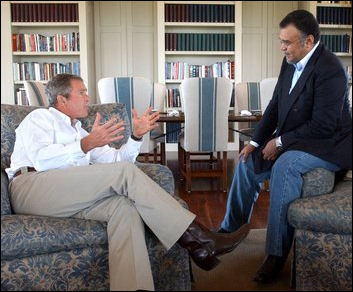
Saudi Prince Bandar bin Sultan
with George BushKate Zernike and Michael T. Kaufman wrote in the New York Times: Bin Laden was “shocked,” a family friend said, to learn that the Americans — the enemy, in his mind — would defend Saudi Arabia, the Muslim holy land. “To him, it was the height of American arrogance. The United States, he told an interviewer later, “has started to look at itself as a master of this world and established what it calls the new world order.” The Saudi government restricted him to Jidda, fearing that his outspokenness would offend the Americans. [Source: Kate Zernike and Michael T. Kaufman, New York Times, May 2, 2011]
Feeling that he had been betrayed by the Saudi royal family, Osama bin Laden sought the company of religious scholars, who convinced him to release fatwas that it was the duty of Muslim to receive military training and prepare themselves for jihad. He helped persuade some 4,000 Arabs to make the trip to Afghanistan for training. The Saudi government brought him in for questioning and kicked him out of the country.
In the early 1990s bin Laden moved to Pakistan and then to Afghanistan, where he tried to act as an intermediary between feuding mujahidin factions but was told to mind his business and not meddle in domestic Afghanistan politics. Finally he was told to leave. In 1994, after being charged with smuggling weapons from Yemen into Saudi Arabia and agitating against the Saudi royal family, bin Laden was stripped of his Saudi citizenship and his assets in the kingdom were frozen.
Bin Laden responded by lashing out at the Saudi Arabia government and the royal family and writing lengthy essays denouncing the royal family, which he circulated by fax. Terrorist activities that occurred in Saudi Arabia after that were blamed on him. According to some accounts bin Laden spent three months in London in early 1994. He met with bankers and supporters, and went to Sudan just before he was to be extradited to Saudi Arabia.
Osama bin Laden in Sudan
_svg.png)
present day Sudan After being kicked out of Saudi Arabia, bin Laden sought refuge in Sudan. At the time Sudan was: 1) controlled by purist Islamic rulers, 2) was a beachhead for fundamentalist Muslim activities and jihadism and 3) allowed citizens of Arab countries to enter without visas. The Sudanese government welcomed bin Laden more for his construction and engineering skills than his links to jihad fighting. The Saudis and Americans were suspicious of his activities there. Sudan was one of the few countries that supported Iraq in the Persian Gulf war.
Osama bin Laden was in Khartoum, Sudan for five years, from April 1991 to May 1996. He lived in a high-walled house in Khartoum’s Riyadh neighborhood and worked there as a construction engineer. Kate Zernike and Michael T. Kaufman wrote in the New York Times, Sudan “was offering itself as a sort of haven for terrorists, and there he began setting up legitimate businesses that would help finance Al Qaeda. He also built his reserves, in 1992, paying for about 500 mujahedeen who had been expelled from Pakistan to come work for him.” [Source: Kate Zernike and Michael T. Kaufman, New York Times, May 2, 2011]
Lawrence Wright wrote in The New Yorker: He arrived in Khartoum with his three wives and his fifteen children, and devoted himself to breeding Arabian horses and training police dogs. He went into business, investing heavily in Sudanese construction projects, including an airport and the country's main highway; he also bought up the entire crop of Sudanese cotton, and he occasionally picked up the tab for the country's oil imports. In those early days in Khartoum, bin Laden felt secure enough to walk to the mosque five times a day without his bodyguards. [Source: Lawrence Wright, The New Yorker, September 16, 2002]
Osama bin Laden and his associates obtained a near monopoly on gum arabic, one of Sudan’s leading exports. His construction company built much of the highway between Khartoum and Port Sudan. He also grew sunflowers and invested in a tannery, agriculture projects and construction. He bought large amounts of agriculture land in the Soba area south of Khartoum and helped found a bank. He spent much of his free time with his horses.
Osama bin Laden’s Jihadist Activities in Sudan
In Sudan, Osama bin Laden was known more as financier of terrorism and jihadist activities than a terrorist leader. Al-Qaida at that time attracted the attention of wealthy Saudi investors and founded charities and aid programs that also supported their terrorist activities. Quietly Osama bin Laden set up camps to train terrorists, smuggled weapons to Egypt and Yemen and held picnics for terrorists.
Khartoum attracted disaffected Muslim extremists from all over the globe. Osama bin Laden had many contacts and friends who shared similar jihadist views as himself. Among theme were Ayamn al-Zawahiri, the Egyptian doctor that would become the brains behind Al-Qaida. Despite his help, the Sudanese government was never comfortable with bin Laden in its country. People that knew bin Laden described him as a “very shy and humble person...but also a determined person.”
In Sudan, bin Laden helped train and finance jihadis that were sent to Somalia and Bosnia, among other places. John-Thor Dahlburg and Alex Rodriguez wrote in the Los Angeles Times: “In Sudan he put his organizational and financial talents to work to devise a way to fund radical Islamic groups. Bin Laden set up a trading company to that could engage in import-export operations without arousing suspicion. He also formed a holding company that controlled investments in at least nine firms that allegedly would come to mix legitimate commercial endeavors with terrorism. He was joined in Sudan by several hundred "Arab Afghans," veterans of the anti-Soviet jihad, and training camps were set up. [Source: John-Thor Dahlburg and Alex Rodriguez, Los Angeles Times May 2, 2011]
“It was in his adopted African home that Bin Laden undertook the real work of developing Al Qaeda into a well-financed terrorist operation capable of adapting quickly to changing circumstances. In Khartoum, Bin Laden attracted the attention of U.S. authorities, who put pressure on the Sudanese to expel him as a way of quelling his activities. In 1995, Sudan reportedly made a secret offer to Saudi Arabia to turn over Bin Laden. But the Saudis, who had revoked his citizenship the previous year after Bin Laden advocated the overthrow of King Fahd, declined.
“Osama seemed to believe during this period,” Coll wrote in “The Bin Ladens”, “that he could have it all in Sudan — wives, children, business, horticulture, horse breeding, leisure, pious devotion and jihad — all of it buoyed by the deference and public reputation due a proper sheikh. He did not yet seem to grasp that his enterprise, particularly in its support for violence against governments friendly to or dependent upon the Al-Saud, might prove difficult to reconcile with the interests of his family in Jeddah.” [Source: “The Bin Ladens: An Arabian Family in the American Century” by Steve Coll (Penguin Press, 2008)]
Osama bin Laden Kicked Out of Sudan
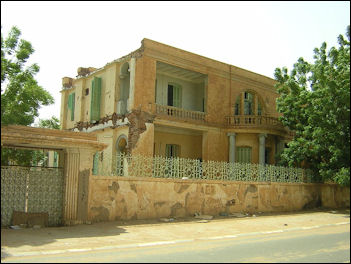
Colonial house in Khartoum Paul Haven of AP wrote: In 1996, Osama bin Laden left Sudan “as Washington was pressuring the Sudanese government to expel him. The Clinton administrative tried to convince the Saudi Arabian government to accept him but they refused. Instead he went off to Afghanistan. It has been argued that if the Clinton administration had never forced him to leave Sudan he would not have become increasingly radicalized.” Saudi Arabia refused to take bin Laden in part because it was afraid a trial would destabilise the country. [Source: Paul Haven, AP, May 2, 2011]
Lawrence Wright wrote in The New Yorker: “Zawahiri and bin Laden might have remained in the sanctuary of the Sudan had it not been for the determination of the Egyptian and Saudi intelligence services to kill them before they caused any more trouble. (The Saudi government stripped bin Laden of his citizenship in 1994.) He had already survived two attempts on his life. A deranged Islamic extremist, intending to assassinate him, shot up a mosque in Khartoum and was captured as he made his way to bin Laden's house. On another occasion, a Toyota pickup carrying four Yemeni mercenaries opened fire on bin Laden's home and his guesthouse, where he had his office. Three of the Yemenis and two of bin Laden's bodyguards were killed in the ensuing gunfight; the other attacker was captured and executed by the Sudanese authorities. Bin Laden, in his sometimes oblique language, told a reporter that he blamed "regimes in our Arabic region" for the assaults. Zawahiri increased bin Laden's security, surrounding him with Egyptian bodyguards. [Source: Lawrence Wright, The New Yorker, September 16, 2002]
When the the Sudanese government decided to expel bin Laden some members of Islamic Jihad proposed that bin Laden undergo plastic surgery and sneak into Egypt, but Zawahiri said that Egypt was too dangerous. In May of 1996, bin Laden chartered a jet and took a number of his colleagues, along with his ever-growing family, to Jalalabad, in eastern Afghanistan.” Haven of AP wrote: “Among those left behind were his lively white mare Swift Like the Wind and three other horses.
Osama bin Laden Seeks Asylum in Britain
Daniel McGrory wrote in The Times: Osama bin Laden sought asylum in Britain even as he was planning the September 11 attacks on the US. The al-Qaeda leader wanted to abandon his base in Sudan at the end of 1995 and asked some of his followers in London to sound out whether he would be able to move to Britain. Michael Howard, who was then Home Secretary, recalls how his aides told him of the asylum request from the Saudi-born militant of whom the world knew little... A number of his brothers and other relatives, all members of the wealthy bin Laden construction empire, owned properties in London by the mid-1990s. [Source: Daniel McGrory, The Times, October 2005]
The astonishing approach to the British authorities happened only months after bin Laden had secretly organised a terror summit in Manila in January 1995 to begin planning how hijackers would turn passenger planes into flying bombs. He called it the “Bojinka plot”, which is Arabic slang for an explosion. By this time bin Laden had also transferred some of his considerable personal fortune to London for his followers to establish terror cells here and across Europe. His name rarely appeared in the British media even though by late 1995 his network had already bombed a number of US army bases abroad and plotted assassination attempts against Pope John Paul II and President Clinton.
Howard told The Times: “In truth, I knew little about him, but we picked up information that bin Laden was very interested in coming to Britain. It was apparently a serious request. He already had people operating here, and who knows how history could have been rewritten if he had turned up here?” Bin Laden never got a chance to make a formal application as Home Office officials investigated him and Mr Howard issued an immediate banning order under Britain’s immigration laws... Bin Laden had, according to Home Office officials, used a Saudi businessman, Khaled al-Fawaz, to sound out his chances of coming to Britain. At the time al-Fawwaz was bin Laden’s “defeacto ambassador” in Britain.
Osama bin Laden Returns in Afghanistan
Osama bin Laden arrived back in Afghanistan in May 1996 on a plane with his three wives and 13 children, a troop of bodyguards and 150 supporters after being expelled from Sudan. He was allowed into Afghanistan by the government of Burhanuddin Rabbani. John-Thor Dahlburg and Alex Rodriguez wrote In the Los Angeles Times: “It was a very different Afghanistan that Bin Laden came back to. For years, the mujahedin factions that had forged an uneasy alliance against the Communists had been making war on one another. The country was in ruins, and millions had lost their homes and livelihoods. A fanatical militia, the Taliban, was capturing more and more territory. Covertly funded by Pakistani and Saudi intelligence, this band of puritans imposed draconian edicts, banning shaving for men, women's education, and amusements such as music.” [Source: John-Thor Dahlburg and Alex Rodriguez, Los Angeles Times May 2, 2011]
Ahmed Rashid wrote in the Washington Post: “Before the attacks of Sept. 11, 2001, bin Laden's zone of influence was among Pashtuns in Afghanistan, which was the center of the Taliban's power and its major recruiting base. The Pashtuns are Afghanistan's largest ethnic group and have ruled the country for the past 300 years. They were artificially divided by the British so that today millions of Pashtuns also live across the border in Pakistan, many of them in seven so-called tribal agencies where control by the government has been minimal.” [Source: Ahmed Rashid, Washington Post, March 1, 2006]
Noman Benotman, a Libyan who once fought with al-Qaida, told Peter Bergen that bin Laden used to instruct his followers, “You should learn to sacrifice everything from modern life like electricity, air conditioning, refrigerators, gasoline. If you are living the luxury life, it’s very hard to evacuate and go to the mountains to fight.” [Source: Peter Bergen, Washington Post, March 1, 2006]
Paul Haven of AP wrote: In Afghanistan, bin Laden “would wake before dawn for prayers, then eat a simple breakfast of cheese and bread. He closely monitored world affairs. Almost daily, he and his men - Egyptians, Yemenis, Saudis, among others - practiced attacks, hurling explosives at targets and shooting at imaginary enemies. He also went horseback riding, his favourite hobby, and enjoyed playing traditional healer, often prescribing honey, his favourite food, and herbs to treat colds and other illnesses. In Afghanistan, bin Laden was often accompanied by his four wives - the maximum Islam allows. Estimates on the number of his children range up to 23. [Source: Paul Haven, AP, May 2, 2011]
Osama bin Laden Establishes a Hideout in Tora Bora
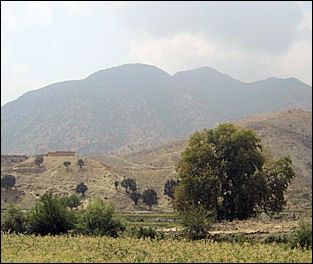
Tora Bora On the cave hideout bin Laden's built in base in Tora Bora, Peter Bergen wrote in the Washington Post: “I climbed steep, scree-covered slopes to reach his Afghan house, perched high above the snow line and commanding views of verdant valleys several thousand feet below. The hamlet, known as Milawa, comprised several lookout posts strung out along ridge lines, a bakery, bin Laden's two-bedroom house and even a crude swimming pool. [Source: Peter Bergen, Washington Post, March 1, 2006]
Abdel Bari Atwan, a Palestinian journalist who met bin Laden in November 1996, six months after bin Laden had settled in Afghanistan, wrote : I was taken with different people to Tora Bora, the mountain overlooking Jalalabad. There was snow at that time. It was very cold — freezing. And then to the favorite cave of Osama bin Laden. And actually it was a very simple cave, and he was waiting. Then we had dinner. Dinner was really awful. There were about 12 people in that cave. The dinner was rotten cheese, this Egyptian cheese. It’s salty cheese — really very bad. And then there were potatoes soaked in cottonseed oil. And also there were about five or six fried eggs, and bread, which was really caked with sand. So I think this is their typical food. They eat very little. It’s bin Laden who actually loves to live such a harsh life with his followers.[Source: Peter Bergen, Vanity Fair, January 2006]
“We didn’t talk about his personal life. We never talked about his wives or something like that, because it is a taboo. He took me on a tourist tour in Tora Bora. We walked for about two hours together. We left the cave about eight o’clock in the morning. It was freezing. And so we went around, and the sun started and it was really beautiful, and he showed me the houses of some of his people, their mud-brick houses there above the snow. They were trying to have their own community, grow their foods, and they are marrying each other. It’s like an oasis in Afghanistan. He was in perfect health. He never complained about how high it was in the mountains and it was freezing. He had dry mouth most of the time. I noted that he drinks a lot of water and tea.”
“He told me how he hated Americans, and he wanted to defeat them even in his agriculture project. So he was actually the happiest man on earth when he managed to produce a sunflower which is a record in its size, much bigger than the American sunflower. He said, “Even I defeated them in agriculture.”
Abu Jandal, a militant at Tora Bora, told Bergen: “Sheikh Osama gave me a pistol and made me his personal bodyguard. The pistol had only two bullets, for me to kill Sheikh Osama with in case we were surrounded or he was about to fall into the enemy’s hands, so that he would not be caught alive. I was the only member of his bodyguard who was given this authority, and I was to use this pistol. I took care to keep the two bullets in good condition and cleaned them every night, while telling myself, “These are Sheikh Osama’s bullets. I pray to God not to let me use them.”
Osama bin Laden and the Taliban
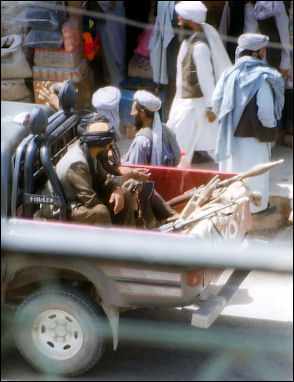
Taliban After Osama bin Laden arrived in Afghanistan from Sudan some Taliban embraced him as a rich man who gave up everything for jihad and treated him like a hero, calling him a “guest” who would be defended to “the last drop of Afghan blood.” The Taliban and Osama bin Laden shared many similar views about sharia and Muslim rule but many Taliban who were not interested in global jihad.
Osama bin Laden exerted a strong influence in Afghanistan and used it for his purposes. Although Osama bin Laden and Al-Qaida used Afghanistan territory there were relatively small number of Afghan members in Al-Qaida. Osama bin Laden is believed to have brought Taliban leader Mohammed Omar under his influence and formed close ties with the Taliban defense minister, interior minister, information and culture minister, security chief, and justice minister. Detailed Al-Qaida documents were found in the home of the defense minister.
Peter Bergen wrote in Vanity Fair: “In the years after bin Laden left Afghanistan, after having helped to drive out the Russians, an armed fundamentalist movement, the Taliban, meaning “religious students,” gradually took over the country. The Taliban emerged in Kandahar in 1994 under the leadership of an enigmatic, reclusive leader, the one-eyed Mullah Omar. The Taliban enjoyed quite a high degree of popularity and legitimacy in their earlier years as they brought order and a measure of peace to a country that had suffered through a decade and a half of civil war. The Taliban were, at least initially, also seen as incorruptible and little interested in assuming power for themselves. [Source: Peter Bergen, Vanity Fair, January 2006]
“The fact that the Taliban were consolidating their hold on Afghanistan just as bin Laden re-based himself there was a fortunate coincidence, which he would exploit masterfully. He entered into a powerful symbiotic relationship with Mullah Omar: al-Qaeda provided the Taliban with some much-needed cash and zealous Arab fighters, while the Taliban provided bin Laden with a sure refuge and carte blanche to build up al-Qaeda’s training camps.”
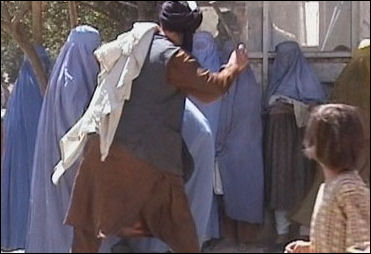
Taliban beating woman in public Paul Haven of AP wrote: “When the Taliban — who would eventually give him refuge — first took control of Kabul in September 1996, bin Laden and his Arab followers kept a low profile, uncertain of their welcome under the new regime. The Taliban leader Mullah Mohammed Omar called bin Laden to southern Kandahar from his headquarters in Tora Bora and eventually through large and continual financial contributions to the isolated Taliban, bin Laden became dependent on the religious militia for his survival. [Source: Paul Haven, AP, May 2, 2011]
John-Thor Dahlburg and Alex Rodriguez wrote in the Los Angeles Times: “Astute about the changing realities, Bin Laden visited Kabul in October 1996 after the Taliban occupied it, and held parleys with the group's leadership. They reportedly got along famously. The Taliban's success in defeating or bribing enemies might have happened without Bin Laden's participation. But he gave the group a valuable shot in the arm by putting up or raising money to finance military campaigns and furnishing dedicated Arab fighters to spearhead the Taliban's assaults. [Source: John-Thor Dahlburg and Alex Rodriguez, Los Angeles Times May 2, 2011]
“To curry favor with the Taliban's supreme leader, a one-eyed son of poor Pashtun farmers named Mullah Mohammed Omar, Bin Laden built him a house. He showered other Taliban dignitaries with money and presents. In return, the Taliban-held lands, which came to include almost all of Afghanistan, became a haven and launch pad for Bin Laden and his version of holy war. He reportedly helped fund and train terrorists for Pakistan who could be infiltrated into Kashmir, the disputed Himalayan region claimed by both India and Pakistan.”
Osama bin Laden in Taliban-Controlled Afghanistan
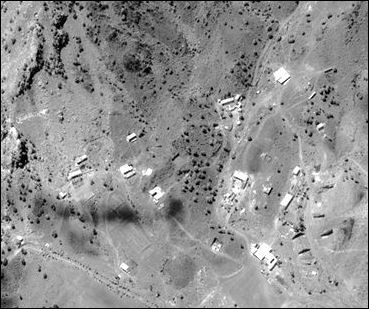
Al-Qaida camp in Afghanistan In 1997, the Taliban uncovered what it said was a Saudi plot to assassinate Bin Laden, and for his own protection, he moved into an old Soviet air base outside Kandahar, the Taliban stronghold in the country's south. After that bin Laden divided his time between his compound near the Kandahar airport and Al-Qaida camps in the mountains and deserts. The Taliban didn’t let anyone go near his house. He moved freely, often traveling from place to place in an armor-plated vehicle with a Kalashnikov in his hand. He occasionally visited the Al-Qaida training camps. Describing a visit by bin Laden to a camp one Al-Qaida fighter told AP, “He met with the commander of the camp, spent some time with the trainees and left. Everyone knew it was him. He didn’t stay long, maybe two hours and then he was gone.”
Osama bin Laden rarely slept in the same place twice and often took his entire family into caves with scorpions and rats to spend the night. Visitors to Osama bin Laden’s house went through three security checks. Osama bin Laden himself was often surrounded by loyal bodyguards. His entourage traveled around in Toyota Land Cruisers.
Osama bin Laden’s location was kept secret. It is thought that he changed his residence often. He followed no pattern, often picked up and moved in the middle of the night and used decoy caravans, disguises and sometimes traveled in an ambulance. When he arrived at camps he was often welcomed with celebratory gun fire.
Osama bin Laden, Money and the Taliban
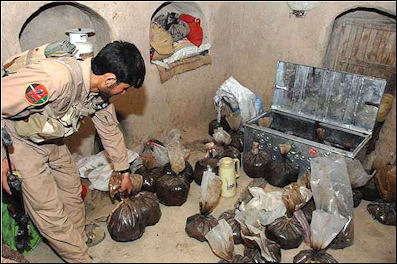
Opium found in alleged
Taliban safe house in Helmand Osama bin Laden reportedly won favors with warlords by lavishing them with gifts. One senior Taliban defector told Newsweek, “He was always handing out $50,000 to this commander, or $100,000 to that commander...And cars — Afghans love cars. He would get 20 or 30 cars and bring them from Kandahar as a present just before an offensive.” One Taliban official said, “He had money in his pocket. Any time he wanted he would just pull it out and give to them...There wasn’t anybody who had power over Osama. He did whatever he wanted.”
According to some estimates, Osama bin Laden funneled as much as $100 million a year — double Afghanistan’s official annual budget — to the Taliban. The Taliban official said, “Al-Qaida was very important for the Taliban because they had so much money. They gave a lot of money. And the Taliban trusted them.”
In June 1993, Steven Coll wrote in “The Bin Ladens” “the family, most likely under pressure from the Saudi government, moved to expel Osama from the Bin Laden companies. The following year the family publicly repudiated him, By 1995, Coll said there was “a hint of King Lear in the wilderness” to his exile. Michiko Kabutani wrote in the New York Times: “He was out of money, one of his wives had divorced him, and his eldest son had left him to return to Saudi Arabia. Isolation fueled Mr. bin Laden’s self-righteousness, however, and his wrath increasingly focused on the United States, particularly after Washington put pressure on Sudan’s government to expel him from Khartoum, leading to his exile in 1996 back to the harsh lands of Afghanistan. [Source:Michiko Kabutani, New York Times, April 1, 2008; The Bin Ladens: An Arabian Family in the American Century by Steve Coll (Penguin Press, 2008)]
Taliban Debate on What to About Osama bin Laden
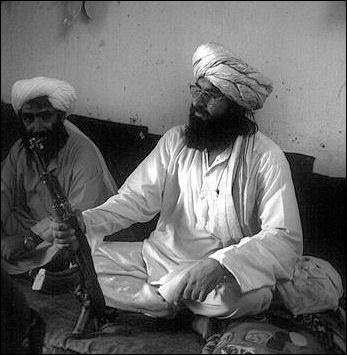
Taliban leader There was some debate within the Taliban as what to do about Osama bin Laden. Many moderates wanted him out of Afghanistan. Even so the Taliban repeatedly defied U.S. pressure to turn him in.
U.S. officials and Taliban representatives met at least 20 times in three continents over a three year period to discuss turning over bin Laden. Negotiations broke down over U.S. insistence that bin Laden face trail in the United States. It was not clear whether the Taliban could deliver bid Laden even if they wanted to. Critics blame the U.S. for not coming up with way for the Taliban to give up bin Laden in a face-saving way that would help the Taliban escape from the humiliation they would face in the Muslim world if word got out they handed over bib Laden to an “infidel” power.
In 1998, two sympathetic Afghan exiles living in London met with Omar and tried to persuade him to give up Osama bin Laden. Omar said that he was willing to do that if the United States recognized the Taliban. The exiles said they couldn’t speak for the U.S. government. Omar then said, the Americans “just want to use the card of Osama to stop our government. Osama is not the issue. Islam is the issue.”
Omar once told the Pakistan government that “he wanted to get rid of Osama but did not know how? and he was “ready to close terrorist training camps.” The Taliban intelligence chief told Osama bin Laden that the Taliban wanted peace and “he should go somewhere else. He got mad and we never spoke again.” [Source: Alan Cullison and Andrew Higgins, Wall Street Journal, August 2, 2002]
Omar began to regard Osama bin Laden as disrespectful, arrogant and publicity seeking. He was annoyed his pronouncements against America and the fact he issued fatwas without having the religious authority to do so.In May 1998, Osama bin Laden held a showy news conference — in which villagers were given guns and used like Hollywood extras movie to give the impression that Al-Qaida controlled a large territory in Afghanistan — that angered the Mullah. Omar said afterwards, How can [bin Laden] hold a press conference without my permission. There is only one ruler. Is it me or Osama?”
In June 1998, Omar agreed to a Saudi request to extradite bin Laden. While the details were being worked out the embassies in Africa were bombed and the United States launched retaliatory cruise missile strikes in Afghanistan made Osama bin Laden.
Osama bin Laden After the Attacks in Kenya and Tanzania
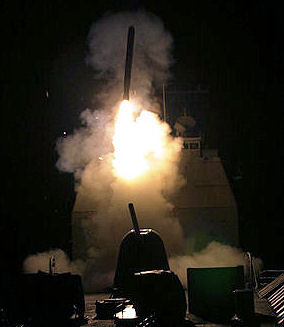
Tomahawk missiles launched for
stike on Al-Qaida camps
in Afghanistan AP reported: Al-Qaida's first major strike after bin Laden returned to Afghanistan was on August 7, 1998, when twin explosions rocked US embassies in Kenya and Tanzania. Most of the victims were African passers-by, but the bombings also killed 12 Americans. [Source: Paul Haven, AP, May 2, 2011]
One suspect was arrested, he later told FBI agents that he had fought in Afghanistan with the Taliban and was handpicked by Bin Laden for the bombing mission. In a pattern that had become familiar, Bin Laden issued a statement welcoming the bombings, which had killed many Muslims. [Source: Los Angeles Times]
Days later, bin Laden escaped a cruise missile strike on one of his training camps in Afghanistan launched by the United States. Bin Laden is believed to have been at the Zhawar Kili Al-Badr camp for a meeting with several of his top men, but left shortly before some 70 Tomahawk cruise missiles slammed into the dusty complex.
The strikes elevated Osama bin Laden to the position of a hero and a unifier of Muslim people. Lawrence Wright wrote in The New Yorker: “The strikes, which, in the big-chested parlance of military planners, were dubbed Operation Infinite Reach, cost American taxpayers seventy-nine million dollars, but they merely exposed the inadequacy of American intelligence. President Clinton later explained that one of the strikes had been aimed at a "gathering of key terrorist leaders," but the meeting in question had occurred a month earlier. According to Russian intelligence sources cited in Al-Majallah, an Arabic magazine in London, bin Laden sold the Tomahawk missiles that failed to explode to China for more than ten million dollars, which he then used to finance operations in Chechnya. [Source: Lawrence Wright, The New Yorker, September 16, 2002]
“The failure of Operation Infinite Reach established bin Laden as a legendary figure not just in the Muslim world but wherever America, with the clamor of its narcissistic culture and the presence of its military forces, had made itself unwelcome. When bin Laden's voice came crackling across a radio transmission: "By the grace of God, I am alive!" — the forces of anti-Americanism had found their champion. Those who had objected to the slaughter of innocents in the embassies in East Africa, many of whom were Muslims, were cowed by the popular response to this man whose defiance of America now seemed blessed by divine favor.
Image Sources: Wikimedia Commons
Text Sources: New York Times, Washington Post, Los Angeles Times, Times of London, The Guardian, National Geographic, The New Yorker, Time, Newsweek, Reuters, AP, AFP, Wall Street Journal, The Atlantic Monthly, The Economist, Global Viewpoint (Christian Science Monitor), Foreign Policy, Wikipedia, BBC, CNN, NBC News, Fox News and various books and other publications.
Last updated July 2012

